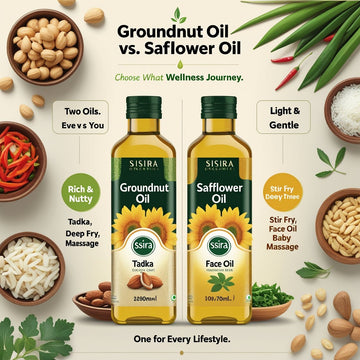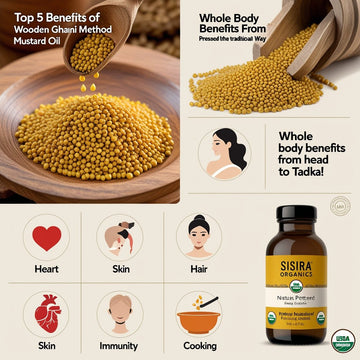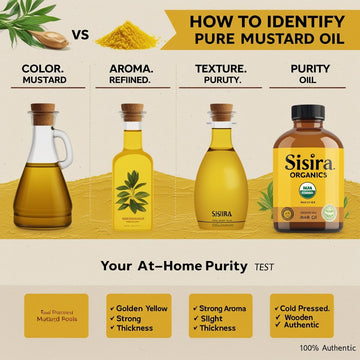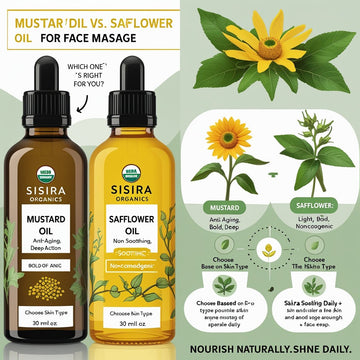When it comes to cooking, the type of oil you use can make a big difference in the taste and healthiness of your meals. But with so many options available, how do you know which oil is best for cooking? Let's explore the different types of cooking oils and their benefits.
Cooking oil is a staple in every kitchen, but choosing the right one can significantly impact your health. While some oils are packed with essential nutrients and beneficial fats, others may contribute to inflammation and chronic diseases. If you’re looking for the best cooking oils for optimal health, here’s a list of the top 10 options that provide nourishment and flavor while supporting overall well-being.
1. Extra Virgin Coconut Oil
Rich in medium-chain triglycerides (MCTs), extra virgin coconut oil boosts metabolism, supports brain health, and provides quick energy. Its high heat stability makes it ideal for frying and baking. Cold-pressed coconut oil from trusted sources like Sisira Organics ensures purity and retains essential nutrients, making it a great choice for everyday cooking.
2. Cold-Pressed Sesame Oil
Sesame oil is a powerhouse of antioxidants and has anti-inflammatory properties. It’s rich in healthy fats that support heart health and improve skin elasticity. Traditional cold-pressing methods help retain its natural aroma and nutrients, making it a preferred choice in Asian and Indian cuisine.
3. Extra Virgin Olive Oil
Olive oil is widely regarded as one of the healthiest oils due to its high levels of monounsaturated fats and polyphenols, which promote heart health. It’s best used for dressings, sautéing, and low-heat cooking to preserve its delicate flavors.
4. Cold-Pressed Groundnut (Peanut) Oil
Groundnut oil is a versatile cooking oil rich in monounsaturated fats, vitamin E, and antioxidants. It helps maintain cholesterol levels and supports overall heart health. Choosing a cold-pressed, chemical-free variety, such as Sisira Organics Groundnut Oil, ensures you get the purest and most nutritious version of this oil.
5. Avocado Oil
Avocado oil is packed with healthy monounsaturated fats, vitamin E, and lutein, which benefits the eyes and skin. With a high smoke point, it’s excellent for grilling, roasting, and high-temperature cooking.
6. Cold-Pressed Safflower Oil
Safflower oil is an excellent source of omega-6 fatty acids and vitamin E, promoting heart health and reducing inflammation. Cold-pressed safflower oil retains its natural nutrients, making it a healthier alternative to refined oils.
7. Cold-Pressed Mustard Oil
Mustard oil has been a traditional favorite for its antibacterial and antifungal properties. It improves digestion, boosts immunity, and supports cardiovascular health. Cold-pressed mustard oil, like the one from Sisira Organics, ensures maximum purity and retains all the essential nutrients.
8. Flaxseed Oil
Flaxseed oil is an excellent source of plant-based omega-3 fatty acids, which support heart and brain health. It is best consumed raw, drizzled over salads, smoothies, or dips.
9. Walnut Oil
Loaded with omega-3s and antioxidants, walnut oil helps reduce inflammation and support cognitive function. It has a delicate, nutty flavor that pairs well with salads and cold dishes.
10. Ghee (Clarified Butter)
Although not a traditional oil, ghee is packed with healthy fats and fat-soluble vitamins like A, D, E, and K. It promotes digestion, boosts immunity, and enhances nutrient absorption. When made from organic, grass-fed butter, ghee is one of the healthiest cooking fats available.
Smoke Point Matters
One of the most important factors to consider when choosing an oil for cooking is its smoke point. The smoke point is the temperature at which an oil starts to break down and produce smoke. Oils with high smoke points are ideal for high-heat cooking methods like frying and searing, while oils with low smoke points are better suited for light sautéing or salad dressings.
Heart-Healthy Options
For those looking to prioritize heart health, oils high in unsaturated fats are the way to go. Olive oil, avocado oil, and canola oil are all excellent choices, as they are rich in monounsaturated fats that can help lower bad cholesterol levels and reduce the risk of heart disease.
Versatile and Neutral: Canola Oil
Canola oil is a versatile and neutral-tasting oil that works well for a variety of cooking methods. With a high smoke point and a mild flavor, canola oil is a great all-purpose oil for frying, baking, and sautéing. Plus, it's budget-friendly and widely available in most grocery stores.
Conclusion
When it comes to choosing the best oil for cooking, consider the smoke point, health benefits, and flavor profile of the oils available. Whether you're looking for a heart-healthy option like olive oil or a versatile choice like canola oil, there's a cooking oil out there to suit your needs. Experiment with different oils to find the perfect match for your favorite recipes!









